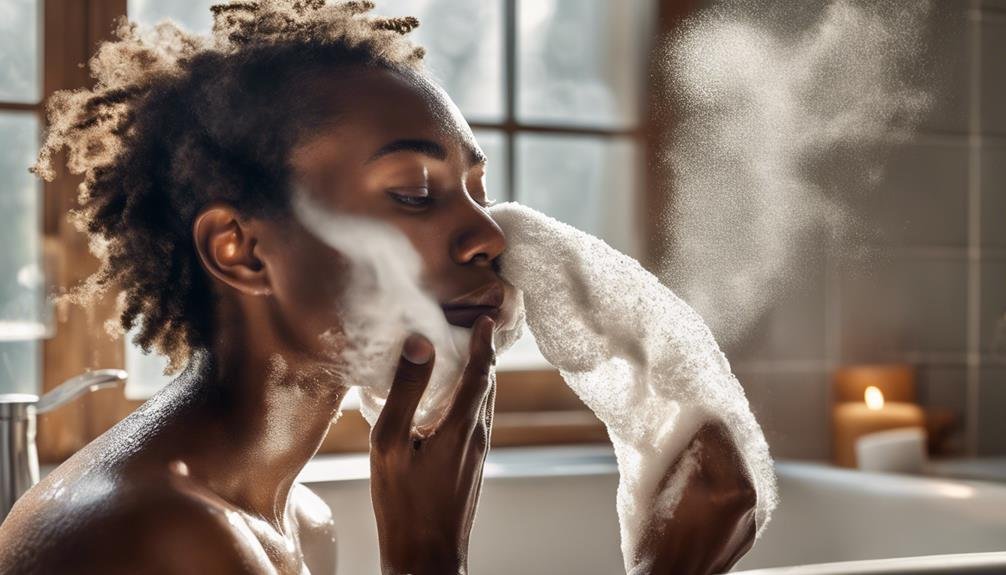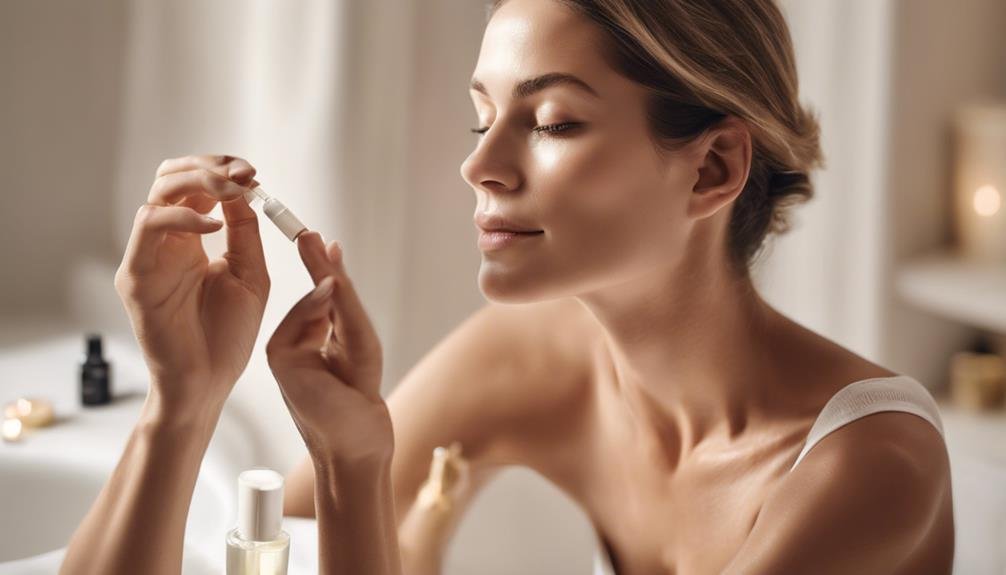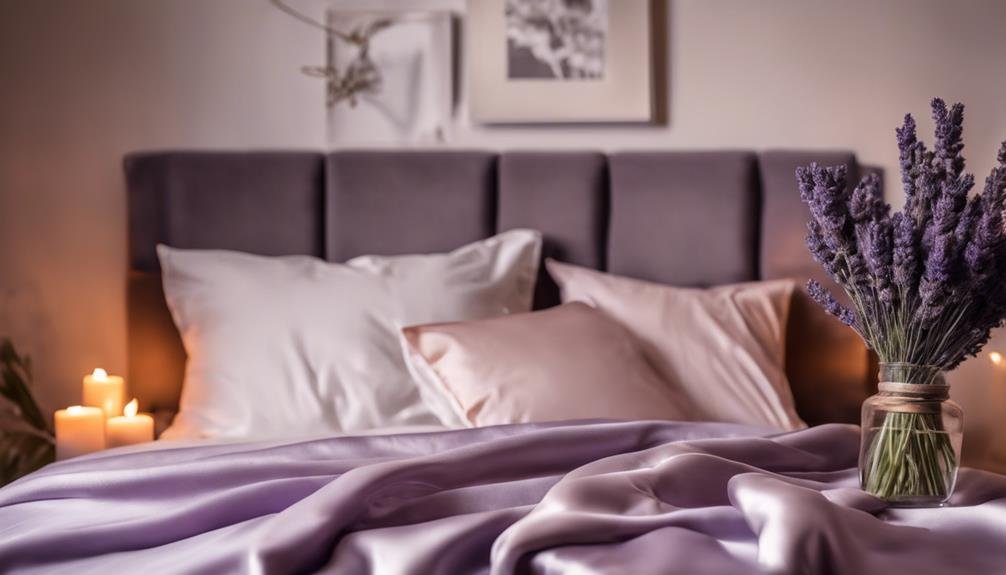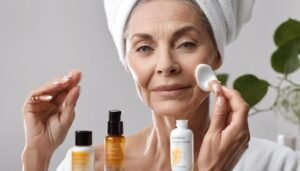When it comes to achieving healthy and radiant skin, the key lies not just in the products you use but also in the way you care for your skin. By incorporating stress-free skincare tips into your daily routine, you can transform your skincare regimen into a calming and rejuvenating experience. From simple relaxation techniques to mindful skincare practices, there are various ways to pamper your skin while promoting overall well-being. Interested in discovering how you can achieve a stress-free approach to skincare?
Key Takeaways
- Simplify your routine for less stress.
- Practice mindfulness during skincare rituals.
- Incorporate relaxation techniques into your routine.
- Use calming products with soothing ingredients.
- Take time for self-care to reduce stress levels.
Morning Cleansing Routine

Wondering how to kickstart your day with a refreshing skin care routine? The key to a successful morning cleansing routine lies in selecting the right products for your skin type.
Start by washing your face with a gentle cleanser to remove any impurities that have accumulated overnight. Look for a cleanser with ingredients like salicylic acid or benzoyl peroxide if you have oily or acne-prone skin, or opt for a hydrating cleanser if your skin tends to be dry.
After cleansing, consider using a toner to help balance your skin's pH levels and prepare it for the next steps in your routine.
Follow up with a lightweight moisturizer that contains SPF to protect your skin from harmful UV rays throughout the day.
Don't forget to apply an eye cream to combat puffiness and dark circles, and finish off with a lip balm to keep your lips hydrated.
Nighttime Skin Care Ritual
Enhancing your skin's rejuvenation process during the night is essential for maintaining a healthy complexion. Establishing a nighttime skincare ritual can help repair and nourish your skin while you sleep, promoting a radiant and youthful appearance. Here's a simple yet effective routine to incorporate into your nightly regimen:
| Step | Details |
|---|---|
| 1. Cleanse | Gently wash away the day's impurities with a mild cleanser. |
| 2. Hydrate | Apply a hydrating serum or night cream to lock in moisture. |
| 3. Treat | Target specific skin concerns with a treatment like retinol for anti-aging or salicylic acid for acne. |
| 4. Eye Care | Pat on an eye cream to reduce puffiness and diminish dark circles. |
| 5. Moisturize | Finish off with a nourishing moisturizer to keep your skin supple and smooth. |
Following this routine can help your skin repair and rejuvenate overnight, waking up with a refreshed and revitalized complexion.
Gentle Exfoliation Techniques

To effectively care for your skin, incorporating gentle exfoliation techniques into your skincare routine can help promote a clearer and smoother complexion. Exfoliation involves removing the dead skin cells on the surface of your skin, revealing a fresher, brighter layer underneath. Opt for exfoliating products with fine granules or gentle acids like alpha hydroxy acids (AHAs) or beta hydroxy acids (BHAs) to prevent irritation. It's important to exfoliate no more than 1-2 times per week to avoid over-exfoliation, which can damage your skin's protective barrier.
When exfoliating, use gentle circular motions and avoid applying too much pressure to prevent micro-tears in the skin. Additionally, be mindful of any existing skin conditions or sensitivities that may require you to choose a milder exfoliation method.
After exfoliating, follow up with a hydrating moisturizer to nourish and protect your skin. By incorporating gentle exfoliation techniques into your skincare routine, you can achieve a healthier and more radiant complexion.
Hydration Inside and Out
Maintaining proper hydration is essential for healthy skin. Hydrated skin looks plump, vibrant, and youthful. Here are three tips to help you keep your skin hydrated inside and out:
- Drink Plenty of Water: Staying hydrated from within is crucial for skin health. Aim to drink at least 8 glasses of water a day to keep your skin hydrated and glowing.
- Use a Hydrating Moisturizer: Choose a moisturizer with hydrating ingredients like hyaluronic acid or glycerin to lock in moisture and prevent water loss from the skin.
- Eat Water-Rich Foods: Incorporate foods with high water content into your diet, such as cucumbers, watermelon, and oranges. These foods not only hydrate your body but also provide essential nutrients for healthy skin.
Sun Protection Essentials

Ensuring adequate sun protection is paramount for maintaining healthy and youthful skin. Exposure to the sun's harmful UV rays can lead to premature aging, dark spots, and an increased risk of skin cancer. To protect your skin effectively, always wear sunscreen with an SPF of 30 or higher, even on cloudy days. Reapply sunscreen every two hours, especially if you're swimming or sweating.
In addition to sunscreen, wearing protective clothing like wide-brimmed hats, sunglasses, and long sleeves can shield your skin from UV damage. Seek shade during peak sun hours, typically between 10 a.m. and 4 p.m., when the sun's rays are strongest.
Remember that UV rays can penetrate through windows, so it's essential to wear sunscreen even indoors.
Stress-Relieving Face Masks
Sun protection is crucial for preserving your skin's health and appearance. However, stress can also impact your skin negatively. Incorporating stress-relieving face masks into your skincare routine can help promote relaxation and maintain healthy skin. Here are some tips for using face masks to relieve stress:
- Choose the Right Ingredients: Opt for face masks containing ingredients like lavender, chamomile, or green tea, known for their calming properties.
- Set the Mood: Create a relaxing environment by dimming the lights, playing soft music, and taking deep breaths while your face mask works its magic.
- Practice Self-Care: Using a face mask isn't just about skincare; it's a form of self-care. Take this time to unwind, disconnect from stressors, and focus on yourself.
Incorporating stress-relieving face masks into your skincare routine can provide not only physical benefits but also mental relaxation, helping you achieve a healthy and glowing complexion.
Nourishing Skin Serums

Skin serums are potent formulations designed to deliver concentrated active ingredients directly to your skin, addressing specific concerns and providing targeted nourishment. These lightweight products contain high levels of active ingredients like vitamins, antioxidants, and peptides that penetrate deep into the skin, offering a powerful boost to your skincare routine.
When choosing a skin serum, consider your skin type and the concerns you want to address. For dry skin, look for serums with hyaluronic acid or ceramides to hydrate and plump the skin.
Those with oily skin may benefit from serums containing niacinamide or salicylic acid to control excess oil production and minimize pores.
Anti-aging serums often contain retinol or vitamin C to promote collagen production and reduce fine lines and wrinkles.
Integrate a nourishing skin serum into your daily skincare regimen after cleansing and before moisturizing for optimal results. By targeting specific skin concerns with these potent formulations, you can achieve healthier, more radiant skin.
Relaxing Facial Massages
To enhance your skincare routine further and promote relaxation, consider incorporating regular facial massages into your regimen. Facial massages offer more benefits than just relaxation; they can improve circulation, reduce puffiness, and enhance product absorption. Here are three reasons why including facial massages in your routine can be beneficial:
- Improved Blood Circulation: Facial massages help stimulate blood flow, bringing vital nutrients and oxygen to the skin's surface, promoting a healthy glow.
- Reduced Puffiness and Tension: Massaging the face can help decrease puffiness by aiding lymphatic drainage and releasing tension in facial muscles.
- Enhanced Product Absorption: Massaging your skincare products into the skin can help them penetrate deeper, maximizing their effectiveness and providing better results.
Incorporating facial massages into your skincare routine not only benefits your skin but also offers a moment of relaxation in your day.
Sleep and Skin Health Connection

In the realm of skincare, one often overlooked yet crucial factor in maintaining healthy skin is the connection between sleep and skin health. Quality sleep is vital for skin regeneration, repair, and overall health. During deep sleep, the body experiences increased blood flow to the skin, allowing for better absorption of nutrients and oxygen, essential for a radiant complexion.
| Benefits of Sleep for Skin Health |
|---|
| 1. Reduced inflammation |
| 2. Enhanced collagen production |
| 3. Improved skin hydration |
| 4. Decreased signs of aging |
| 5. Brighter, healthier complexion |
Lack of sleep can lead to a weakened skin barrier, making your skin more prone to issues like dryness, acne, and inflammation. To optimize your skin health, aim for 7-9 hours of quality sleep each night. Creating a soothing bedtime routine, limiting screen time before bed, and ensuring a comfortable sleep environment can all contribute to better sleep quality and ultimately, healthier skin.
DIY Spa Day at Home
The connection between sleep and skin health highlights the importance of self-care routines in maintaining a healthy complexion. One way to pamper yourself and rejuvenate your skin is by indulging in a DIY spa day at home. This simple yet effective practice can help you relax, unwind, and give your skin some much-needed TLC.
DIY Spa Day at Home
- Create a Relaxing Atmosphere: Set the mood with calming music, dim lighting, and scented candles to enhance the spa experience.
- Skin Exfoliation: Use a gentle scrub to remove dead skin cells, revealing a smoother complexion.
- Hydrating Face Mask: Treat your skin to a hydrating mask to nourish and revitalize your face.
Mindful Skincare Practices

Enhancing your skincare routine with mindful practices can significantly impact the health and appearance of your skin. Mindful skincare involves being present and intentional with each step of your routine. Start by taking a few deep breaths before you begin, allowing yourself to relax and focus on the moment.
As you cleanse your face, gently massage the product in circular motions, paying attention to how your skin feels beneath your fingertips. When applying serums or moisturizers, take the time to pat them into your skin, promoting better absorption and circulation.
Mindful skincare also extends to being aware of how your skin reacts to different products. Take note of any changes or sensitivities, and adjust your routine accordingly. By being mindful of what your skin needs, you can tailor your skincare regimen to suit its unique requirements, promoting a healthy and radiant complexion.
Holistic Approach to Skin Wellness
Taking a holistic approach to skin wellness involves considering not just the surface of your skin, but also your overall health and well-being. Your skin is a reflection of your internal health, and nurturing it from the inside out can lead to a glowing complexion. Here are three key aspects to consider:
- Nutrition: Eating a balanced diet rich in fruits, vegetables, lean proteins, and healthy fats can provide your skin with essential nutrients like vitamins A, C, and E, as well as antioxidants that help fight free radicals and promote skin health.
- Hydration: Staying hydrated is crucial for maintaining skin elasticity and a healthy complexion. Aim to drink plenty of water throughout the day to keep your skin well-hydrated from within.
- Stress Management: Chronic stress can wreak havoc on your skin, leading to inflammation and breakouts. Incorporating stress-reducing activities like meditation, yoga, or deep breathing exercises into your daily routine can help improve your skin's overall health and appearance.
Frequently Asked Questions
Can Stress Affect My Skin Even if I Have a Good Skincare Routine?
Yes, stress can impact your skin regardless of a solid skincare routine. Elevated stress levels can lead to inflammation, breakouts, and exacerbate existing skin conditions. Prioritize stress management techniques alongside your skincare regimen for optimal skin health.
How Often Should I Change My Pillowcase for Better Skin Health?
To keep your skin fresh and clear, swap out your pillowcase every 2-3 days. Oil, dirt, and bacteria can build up, causing breakouts and irritation. This simple change can make a big difference in your skin health.
Is It Okay to Use Different Skincare Brands Together?
Yes, it's generally fine to mix skincare brands if you pay attention to compatibility. Check for similar ingredients or consult a dermatologist if unsure. Patch testing new products is wise to prevent adverse reactions.
Are There Specific Foods That Can Help Improve My Skin?
Your skin thrives on nutrients like those found in avocados, walnuts, and sweet potatoes. These foods are packed with vitamins, antioxidants, and healthy fats that can help improve skin health and give you that radiant glow you crave.
Can Lack of Sleep Really Impact the Appearance of My Skin?
Lack of sleep can indeed impact your skin's appearance. It can lead to dullness, puffiness, dark circles, and exacerbate skin conditions. Quality sleep is crucial for skin repair and rejuvenation, so prioritize rest for a healthy complexion.
Conclusion
Incorporating stress-free skincare tips into your daily routine can lead to a healthier and more radiant complexion. Did you know that stress can worsen skin conditions such as acne and eczema? By taking the time to care for your skin in a calming and mindful way, you can not only improve your skin's appearance but also promote overall well-being. Remember, self-care is essential for both your skin and your mental health.




